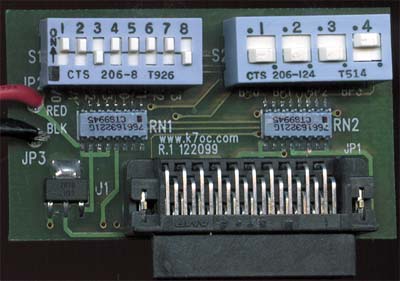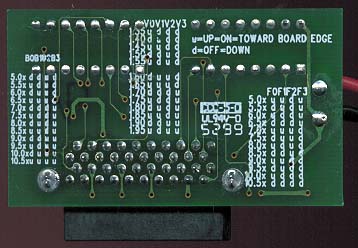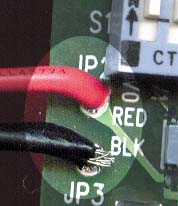Mounting vertically on the Athlon’s feature connector, the K7 Overclock Card is one of the smallest cards we have seen. The K7 Overclock card uses two dip switch blocks in order to adjust the clock multiplier and core voltage of the Athlon.
The first dip switch block features 8 switches; the first four control the clock multiplier and the last four control the voltage. The second dip switch block features 4 switches which, along with the 4 switches from the first block, control the clock multiplier.
The second block features switches that are very easy to adjust because of their enlarged size. While the first block features switches that are considerably smaller, they are still very easy to hit but those with larger fingers may want to use the tip of a pen or a flat head screw driver to adjust the switches without hitting more than one at a time.


One of the problems with having so many switches (8 to control the clock multiplier alone) is that there is always the potential for an incorrect setting, so you’ll want to double check your settings before mounting it on the Athlon.
 Power
is supplied to the card through the use of a 4-pin Y-splitter that is connected
directly onto the card itself. Unfortunately, the connection is not very well
done and the power cables aren’t of the best quality so you’ll want to be gentle
with the card as it wouldn’t be too surprising for the power cable to come loose
from the card. As you can see from the picture to the right, the connection
isn’t too secure.
Power
is supplied to the card through the use of a 4-pin Y-splitter that is connected
directly onto the card itself. Unfortunately, the connection is not very well
done and the power cables aren’t of the best quality so you’ll want to be gentle
with the card as it wouldn’t be too surprising for the power cable to come loose
from the card. As you can see from the picture to the right, the connection
isn’t too secure.
Although the card mounts vertically, it had no problems working with the MC1000 cooler, which puts the Athlon in essentially a sandwich between the Peltier unit and the back plate.
One of the most useful features of the K7 Overclock Card is that it has all of the proper dip switch settings for the multiplier and voltage settings on the back of the PCB so you don’t have to deal with any instruction manuals or pieces of paper have the potential to be lost.
At the time of publication, the K7 Overclock Card seems to be having some supply issues. The ordering page states that the card is back-ordered until late January.
The $49 price tag of the K7 Overclock Card is much more affordable than the $80 of the Afterburner and can be purchased online through the K7 Overclock Card website. The company offers online ordering with VISA and MasterCard as the only credit card purchasing options. They even offer a full 30 day money back guarantee for a full refund of the purchase price minus shipping charges which isn’t a bad deal if you find out that the card doesn’t help you overclock as far as you’d like to go with your current setup.
Setting up the card may seem difficult the first time around, but the fact that all of the settings are diagramed on the back of the PCB is a very useful feature because everything you would need to know is on the card.










0 Comments
View All Comments